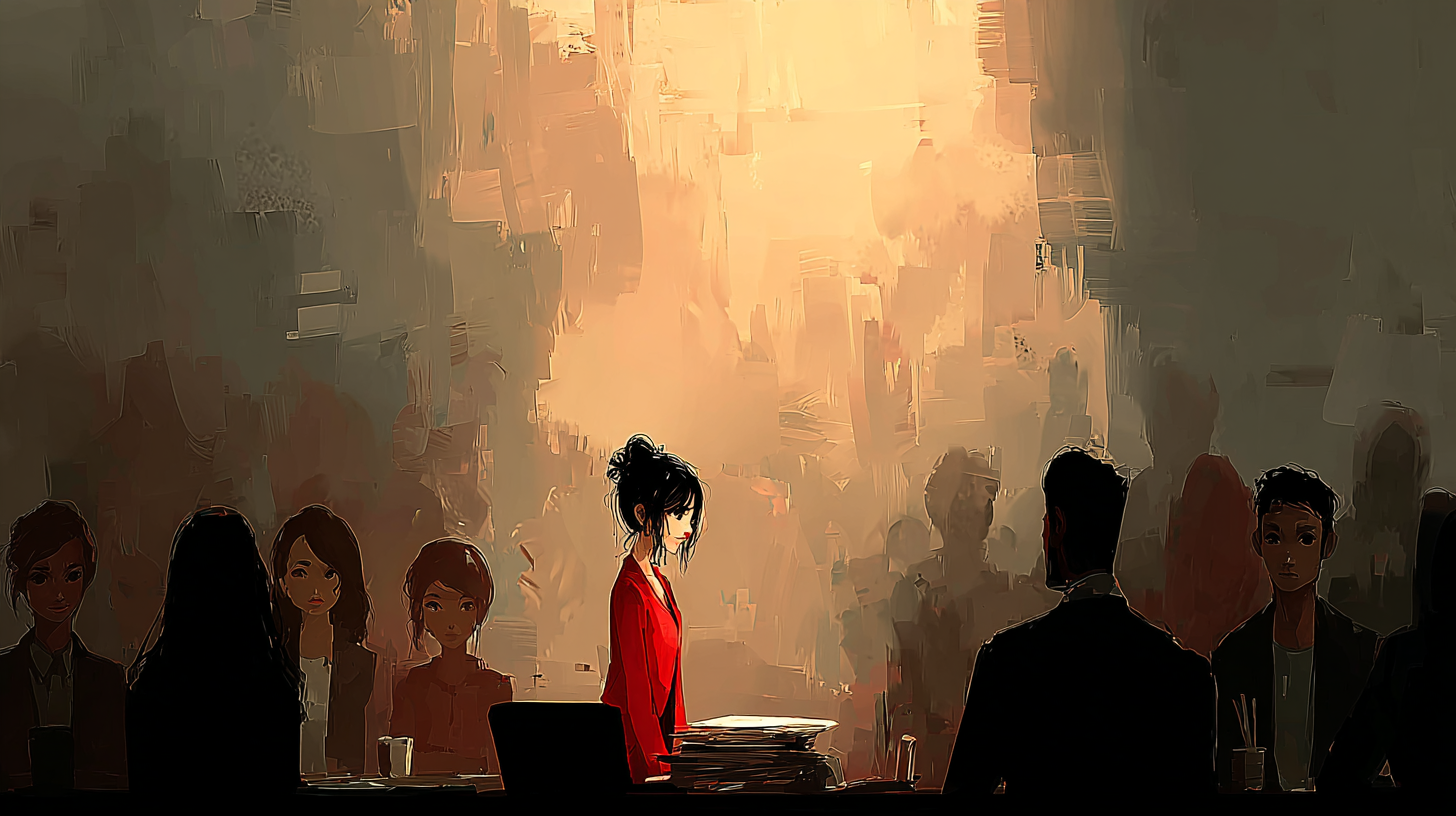A stereotype is a fixed idea about a person or group that is not always true.
ステレオタイプは、人やグループについて決めつけたイメージのことだよ。
以下は英単語 “stereotype” に関するストーリー型学習コンテンツです。まずは大枠の意味を理解して最後の文章で確認しましょう。
主な意味(main meaning)
| 品詞 | 意味 | 発音記号 | 英語例文 |
|---|---|---|---|
| 名詞 (noun) | ある集団に対して、事実に基づかず一様に決めつけられた考え | /ˈstɛriəˌtaɪp/ | The movie reinforces a stereotype about teenagers being lazy. |
| 動詞 (verb) | 型にはめる、決めつける | /ˈstɛriəˌtaɪp/ | She felt stereotyped as just a housewife. |
語源(etymology)
「stereotype」はフランス語 stéréotype から来ており、元々は「印刷の型(plate)」を意味していました。
ギリシャ語「stereos(固い)」+「typos(型)」が語源で、「型にはめる」「決まった形にする」というイメージがあります。
類義語(synonyms)
| 類義語 | 例文 |
|---|---|
| prejudice | He faced prejudice because of his accent. |
| bias | The article shows a clear bias against immigrants. |
| cliché | Saying “boys don’t cry” is just a cliché. |
| generalization | It’s unfair to make a generalization about all teenagers. |
| assumption | She made the wrong assumption based on his clothes. |
反義語(antonyms)
| 反義語 | 例文 |
|---|---|
| open-mindedness | Open-mindedness helps us understand people better. |
| individuality | The school encourages creativity and individuality. |
コロケーション(collocations)
| コロケーション | 例文 |
|---|---|
| gender stereotype | The ad was criticized for promoting gender stereotypes. |
| racial stereotype | Racial stereotypes often lead to discrimination. |
| cultural stereotype | That’s a common cultural stereotype about the French. |
| challenge a stereotype | She works to challenge stereotypes in media. |
| reinforce a stereotype | The book unfortunately reinforces old stereotypes. |
2項表現(binomials)
| 表現 | 例文 |
|---|---|
| black and white thinking | Stereotypes often come from black and white thinking. |
| right and wrong | Stereotypes ignore the gray areas between right and wrong. |
英語ストーリー(english story)
Title: Breaking the Stereotype
Mina had just joined a global marketing company. As a young woman from Japan, some of her coworkers made assumptions about her. One of them, Jake, thought she would be quiet, shy, and only good at following orders. It was a stereotype (固定観念) he had formed based on movies and cultural clichés (決まり文句).
At first, Mina felt frustrated. She didn’t like being stereotyped. She believed in individuality, and she knew that every person was unique. One day, during a big team project, Mina shared a bold and creative idea. Her presentation was clear and inspiring, and the team decided to use her plan.
Jake was surprised. “I guess I had the wrong assumption,” he said. “You’ve really challenged my stereotypes.”
Mina smiled. “I think it’s important to be open-minded,” she replied.
From then on, the atmosphere in the office changed. People stopped using gender stereotypes and began appreciating each other’s unique talents. Even when new members joined, the team avoided black and white thinking and tried to learn about each person’s background and personality.
Mina proved that cultural stereotypes don’t define who you are. Instead, your actions and ideas show your true value.
和訳
タイトル:ステレオタイプを打ち破る
ミナは国際的なマーケティング会社に入社したばかりだった。日本出身の若い女性ということで、同僚の何人かは彼女に対してある**stereotype(固定観念)を持っていた。ジェイクという同僚は、ミナは静かで恥ずかしがり屋で、言われたことだけをこなすタイプだとassumption(思い込み)をしていたのだった。これは映画や文化的なcliché(決まり文句)**に基づいたものだった。
最初、ミナはそのように**stereotyped(型にはめられる)ことにフラストレーションを感じていた。彼女はindividuality(個性)**を大切にしており、人は誰でもユニークだと信じていた。
ある日、大きなチームプロジェクトの時、ミナは大胆でクリエイティブなアイデアを発表した。彼女のプレゼンはわかりやすく、みんなを感動させたので、チームは彼女の案を採用することにした。
ジェイクは驚いて言った。「自分の思い込みは間違ってたみたいだ。君は僕の**stereotypes(固定観念)**を打ち破ってくれた。」
ミナは微笑んで言った。「**open-minded(心を開いた)**でいることって大事だと思います。」
それから、職場の雰囲気は変わった。みんな**gender stereotypes(性別に関する固定観念)**を使わなくなり、お互いの才能を認め合うようになった。新しいメンバーが入ってきたときも、**black and white thinking(白黒はっきりした考え方)**ではなく、それぞれの人柄や背景を知ろうと努力した。
ミナは、**cultural stereotypes(文化的固定観念)**が人を決めつけるものではないということを証明した。大事なのは、その人の行動と考えなのだ。
Q&A
- Qstereotypeとprejudiceの違いは何ですか?
- A
stereotypeは「決めつけた考え」で、特定の人や集団に対する一般化です。一方、prejudiceは「偏見」で、感情的な嫌悪や否定的な態度を含むことが多いです。
- Qbiasとstereotypeはどう違いますか?
- A
biasは「偏り」で、個人の判断や意見に影響する傾向です。stereotypeは集団に対する固定的なイメージです。biasの方が広い意味を持ちます。
- Qgeneralizationとstereotypeの違いは?
- A
generalizationは「一般化」で、いくつかの事例から共通点を見つけることです。stereotypeはそれが事実に反していても固定された考えになっている場合を指します。
- Qopen-mindednessはなぜstereotypeの反義語になりますか?
- A
open-mindedness(心を開いた態度)は、他人の考えや背景を受け入れる姿勢なので、固定観念(stereotype)を持たない柔軟な考え方の対極にあります。
- Qindividualityとstereotypeはどう関係していますか?
- A
individuality(個性)は、一人ひとりが異なるという考え方です。stereotypeは人々を同じように扱うので、individualityを無視するものと言えます。
- Q「gender stereotype」はどういう意味ですか?
- A
性別に基づく固定観念のことで、たとえば「男は強く、女は優しい」といった決めつけが該当します。
- Q「racial stereotype」はどんなときに使いますか?
- A
人種に基づいた偏ったイメージに対して使います。例えば「〇〇人は〇〇だ」というような思い込みがそれに当たります。
- Q「challenge a stereotype」とはどういう意味ですか?
- A
固定観念に立ち向かう、あるいはそれが間違っていることを証明するという意味です。実際の行動でイメージを変えることを指します。
- Q「reinforce a stereotype」は良くないことですか?
- A
多くの場合、良くないです。reinforceは「強める」という意味なので、誤った固定観念をより強く人々に植え付けることになってしまいます。
- Q「black and white thinking」とstereotypeはどう関係していますか?
- A
black and white thinking(白黒思考)は物事を単純に二分する考え方で、そこからstereotypeのような極端な一般化が生まれやすくなります。



コメント